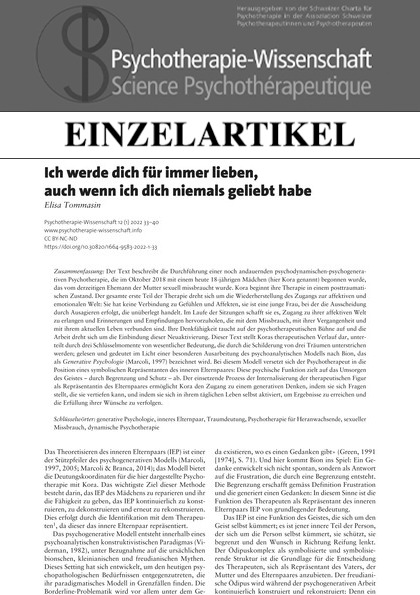I will love you forever, even if I have never loved you
DOI:
https://doi.org/10.30820/1664-9583-2022-1-33Keywords:
generative psychology, inner parents, dream interpretation, adolescent psychotherapy, sexual abuse, dynamic psychotherapyAbstract
The text describes the implementation of an ongoing psychodynamic-psychogenic psychotherapy started in October 2018 with a now 18-year-old girl (here called Kora) who was sexually abused by her mother’s current husband. Kora begins her therapy in a post-traumatic state. The entire first part of the therapy revolves around restoring her access to the affective and emotional world: she has no connection to feelings and affects, she is a young woman for whom acting out is the way to eliminate, who acts without thinking. In the course of the sessions she manages to access her affective world and to bring out memories and sensations connected to the abuse, to her past, and to her current life. Her thinking ability emerges on the psychotherapeutic stage and the work revolves around integrating this reactivation. This text presents Kora’s therapeutic trajectory, divided by three key moments of essential importance, underlined by the description of three dreams; read and interpreted in view of a particular elaboration of Bion’s psychoanalytic model, called Generative Psychology (Marcoli, 1997). In this model, the psychotherapist puts himself in the position of a symbolic representative of the inner parents: this psychic function aims at caring for the mind – through limitation and protection. The incipient process of internalization of the therapeutic figure as a representative of the parents allows Kora to access generative thinking by asking herself questions that she can pursue in-depth, and by activating herself in her daily life to achieve results and pursue the fulfillment of her desires.
Downloads
How to Cite
Tommasin, E. (2022). I will love you forever, even if I have never loved you. Psychotherapie-Wissenschaft, 12(1), 33–40. https://doi.org/10.30820/1664-9583-2022-1-33
Issue
Section
Special Issue
License

This work is licensed under a Creative Commons Attribution-NonCommercial-NoDerivatives 3.0 Unported License.
This journal provides open access to its content in accordance with the basic premise that the free public availability of research benefits the exchange of knowledge throughout the world.
Authors wishing to publish in this journal agree to the following:
- The author/s retain/s the copyrights and consent/s to initial publication of the work in the journal under a Creative Commons Attribution licence, which allows third parties to use the work by citing the name/s of the author/s and this journal as initial publisher (in accordance with the Creative Commons Attribution-NonCommercial-NoDerivs 3.0 DE-Licence).
- The author/s can enter into additional contracts for the non-exclusive distribution (e.g. publish in a collection or book) of the version published in the journal, if the journal is cited as initial publisher.


